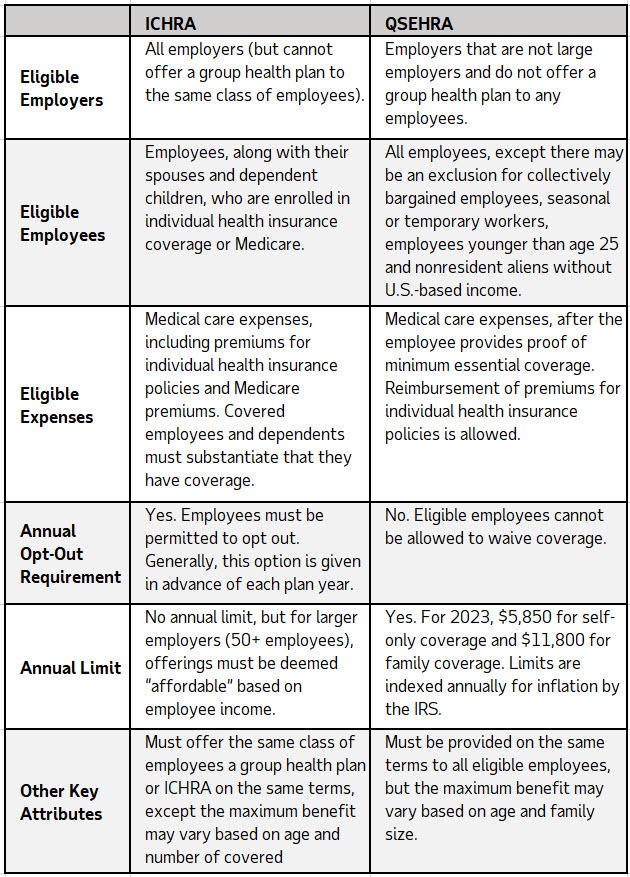HRAs: A New Way to Offer Your Employees Health Benefits

When it comes to benefits, both employers and employees are always looking for the best deal. Sometimes, traditional group health plans just don't cut it. The good news? There are new, innovative offerings available to help businesses support their employees and their needs – without breaking the company bank.
In recent years, the cost of health insurance has gone up significantly. Small businesses, in particular, are finding it more difficult to keep up with the costs and still provide quality health insurance to their employees. Luckily, there are lifelines for all types of businesses to expand their offerings with two fairly new health reimbursement arrangements (HRAs) – the Individual Coverage Health Reimbursement Arrangement (ICHRA) and the Qualified Small Employer Health Reimbursement Arrangement (QSEHRA).
What is an ICHRA vs a QSEHRA?
An ICHRA is a specialized type of HRA that first came about in 2020. They're designed to allow employers of all sizes to compensate their employees for individual market premiums. Employers are also free to set maximum reimbursement limits without the fear of locking their employees into a particular plan, network or insurance company. By taking this route, employees are more likely to find better, more cost-effective plan options for themselves and their families.
Unlike an ICHRA, a QSEHRA assists predominantly smaller employers (those with fewer than 50 employees) who do not offer traditional group health coverage. Under this type of option, businesses are free to help their employees to pay for certain medical expenses, such as a monthly premium. While there are annual limits for both self-only and family coverage, a key positive of a QSEHRA is that these limits are adjusted annually by the Internal Revenue Service (IRS) for inflation.
What are the differences between these HRAs?
Both ICHRAs and QSEHRAs offer a great deal of benefits to employers and their employees, but it's important to understand what makes each unique. The following table1 showcases some key differences:

Which option is best for my business?
The answer isn't as simple as it may seem. "When considering an ICHRA or a QSEHRA, you have to think about your employees and what their needs are," says Lugien Alyousfi , vice president of sales and licensed agent at Automatic Data Processing Insurance Agency, Inc. (ADPIA), an affiliate of ADP®. "As a business owner, you want to offer your employees both the benefits they want and what you can afford."
Here are a couple of things to consider when thinking about an ICHRA or a QSEHRA:
Whether your business has more than 50 employees
If this is the case, ICHRA is likely your top option because you cannot offer a QSEHRA to your employees based on your size. This scenario also affords you greater flexibility. For instance, you can divide your employees into different classes and use varying reimbursement limits based on factors such as full-time vs. part-time, salaried vs. hourly status, or family status. Best yet, you are still allowed to offer some of your employees a traditional group health plan.
Your business is worried about the cost of a new HRA
Depending on the size of your business, this is where either an ICHRA or a QSEHRA could be beneficial. For small businesses, a QSEHRA is preferable because there are annual allowance caps for both single employees and those with a family. For employers who want to offer just a little bit more, the advantage of an ICHRA is that there is no annual allowance cap – meaning that businesses are free to set their own limit based on their capabilities.
If you're still unsure about which one to choose, it's always a good idea to talk to a licensed agent. They will discuss your individual business needs and connect you with a solution that fits your unique business needs.
"Business owners may be scared to try something new," concludes Alyousfi. "But in order to reap the maximum benefits of these cutting-edge HRAs, you need to be willing to do your homework and implement what's best for your company and its employees."
Additional information
To learn more about plan offerings for your employees and your business, check out ADP® affiliate, Automatic Data Processing Insurance Agency, Inc. (ADPIA®), for the latest in insurance offerings.
1 This Compliance Overview is not intended to be exhaustive nor should any discussion or opinions be construed as legal advice. Readers should contact legal counsel for legal advice. ©2019-2023 Zywave, Inc. All rights reserved.
Automatic Data Processing Insurance Agency, Inc. (ADPIA) is an affiliate of ADP, Inc. All insurance products will be offered and sold only through ADPIA, its licensed agents or its licensed insurance partners; One ADP Blvd. Roseland, NJ 07068. CA license #0D04044. Licensed in 50 states. Certain services may not be available in all states with all carriers. Some carriers may charge an additional fee for services. This information is not intended as tax or legal advice. If you have any questions, contact a tax or legal professional. ADP, the ADP logo and ADPIA are registered trademarks of ADP, Inc. Copyright © 2023 ADP, Inc. All rights reserved.



